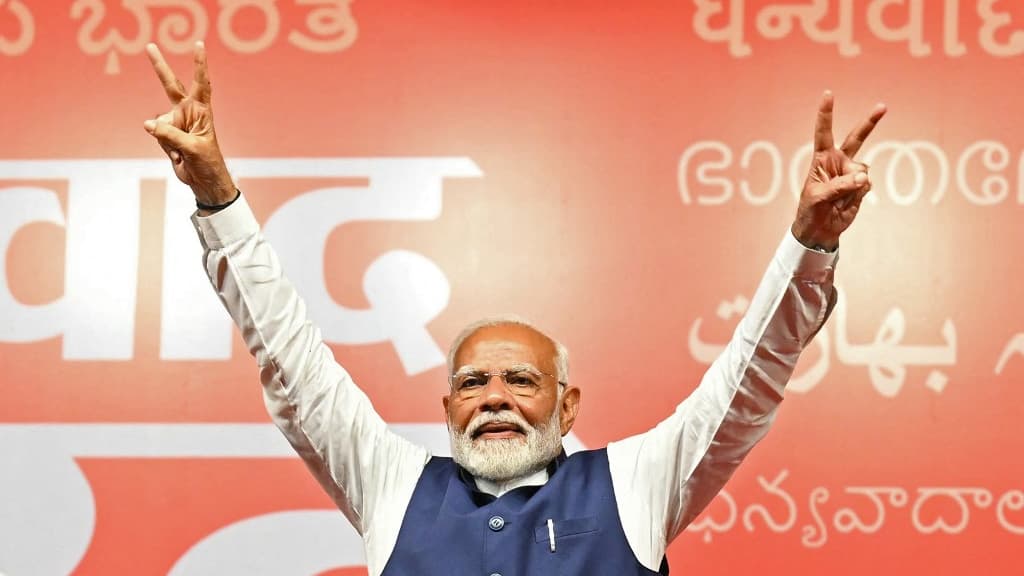With 99% of ballots counted, Prime Minister Narendra Modi’s BJP and its allies are leading with at least 291 seats. You need 272 seats to secure a majority in the 543-seat lower house. The main opposition party will win 99 seats compared with 52 five years ago.
Indian Prime Minister Narendra Modi claimed victory for his party and its allies on Tuesday, June 4 in legislative elections but with his majority in parliament reduced, the country was rejected by the opposition that emerged stronger from the polls.
Analysts and opinion polls have predicted a landslide victory for Narendra Modi and his party, whose campaign has appealed to the Hindu majority but disappointed religious minorities.
But for the first time in a decade, Modi's Bharatiya Janata Party (BJP) may not win an absolute majority on its own and may be forced to rely on coalition allies, according to figures from the election commission.
India has put its trust in the ruling coalition “for the third time in a row,” Narendra Modi wrote on social media. The prime minister was re-elected as a member of parliament from the Varanasi constituency, his third victory also in ancient Banaras, the holy city of Hinduism.
The main opposition party gained seats
The Congress, the main opposition party, looks set to win nearly double its number of parliamentary seats, a remarkable turnaround achieved thanks to a pact aimed at fielding a single candidate against the BJP's frenzied machine.
“The country is saying to Narendra Modi: ‘We don’t want you,’” Congress leader Rahul Gandhi, who was re-elected by more than 364,000 votes in the southern Wayanad constituency, told reporters.
“The BJP itself failed to get a majority,” Congress MP Rajeev Shukla told reporters. “It is a moral defeat for them.”
With 99% of the votes counted, the BJP and its allies are leading by at least 291 seats. You need 272 seats to have a majority in the 543-seat lower house. The BJP is leading by just 239 seats, according to these partial results, far fewer than the 303 it won in 2019. In contrast, the Congress will win 99 seats compared with 52 five years ago.
A Prime Minister who remains popular
Faced with a better-than-expected score from the opposition and a reduced majority for the BJP, the benchmark Sensex index fell more than 7% on the Bombay Stock Exchange, before recovering to close down 5.7%. Shares of Indian billionaire Gautam Adani, a key Modi ally, fell 25% during the session.
Narendra Modi, 73, who remains hugely popular after two terms in office, said this weekend he was confident that “the people of India have voted in huge numbers” to re-elect him, after a decade as the country's leader.
The prime minister’s opponents, sometimes hamstrung by internal feuds, are struggling to cope with the power of his party and accuse the government of exploiting justice for political ends by increasing the number of prosecutions against them. The American foundation Freedom House also estimates that the BJP is “increasingly using state institutions to target political opponents.”
Participation rate 66.3%
Decrying a backsliding on democracy, the opposition and human rights advocates have accused Modi of favouring the country's majority Hindus, to the detriment of minority groups, including India's 210 million Muslims, who fear for their future.
In turn, Narendra Modi accused the Congress of wanting to distribute “national wealth” to “infiltrators”, “to those who have the most children”, thus pointing at the Muslim community. Angered, the opposition contacted the election authorities who did not sanction the Prime Minister.
Some 642 million Indians voted in the seven-phased election over six weeks, drawing high turnout. Of the 968 million voters registered by the Election Commission, 66.3% of voters turned out to vote, a slight decrease from 2019's 67.4% turnout.
Most read

“Twitter junkie. Hipster-friendly bacon expert. Beer ninja. Reader. Communicator. Explorer. Passionate alcohol geek.”







